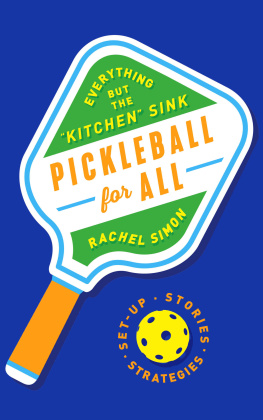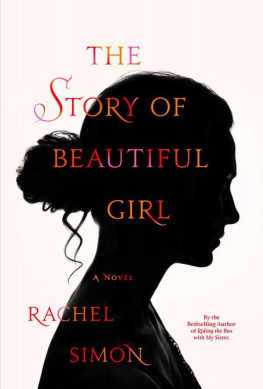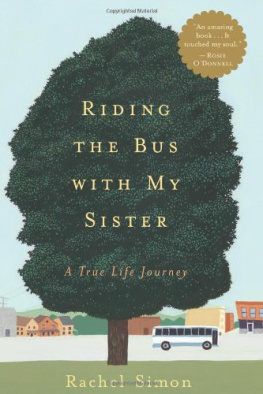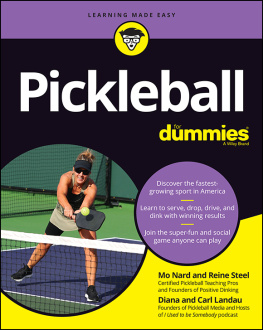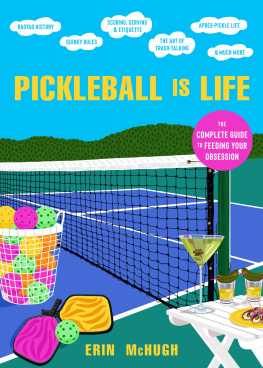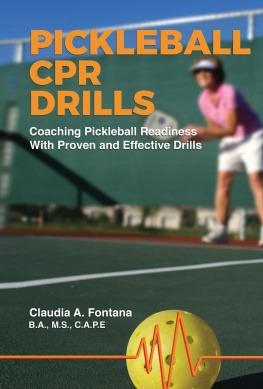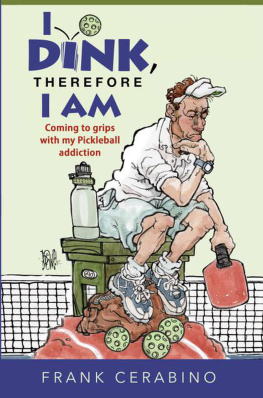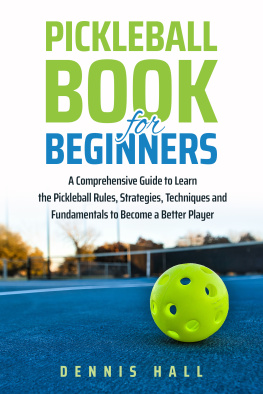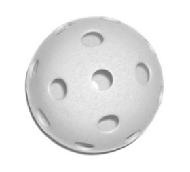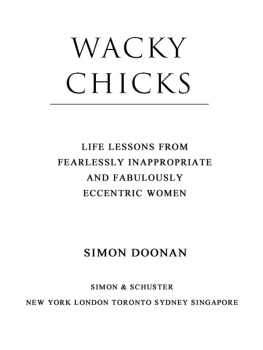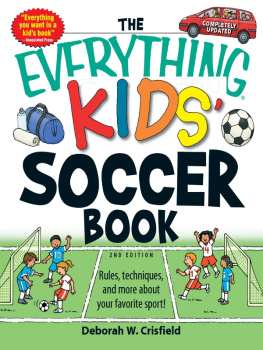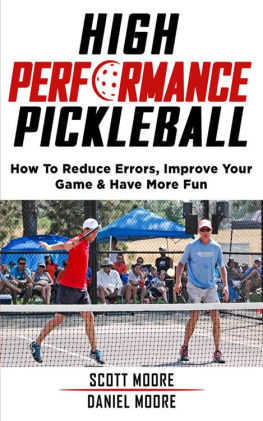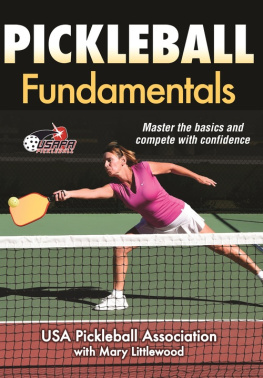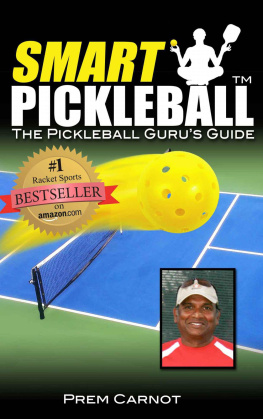Contents
Guide
For Kurt, my partner in pickleball and life.
Contents
There are countless people Ive met and memories Ive madeand will continue to makethanks to pickleball. You can bet anywhere I travel, I have a paddle on hand in case I find a group looking for an extra player.
Dave Gould, 4.0-level pickleball player
I n March 2020, Kurt (my then boyfriend and now husband) and I were spending the early days of the pandemic in the same boat as millions of other people: quarantining with our family in the North Carolina suburbs, adjusting to Zoom meetings and work-from-home life, and entertaining ourselves with marathons of Tiger King. We were craving new ways to pass the time and keep ourselves distracted from the increasingly frightening news, but our options were limited. Walks? Too repetitive. Board games? Too tedious. Group hangouts? Too unsafe. In other words: we were really, really, bored.
And then, at the beginning of April, Kurts parents gifted him a set of pickleball paddles and balls for his birthday. Neither of them had any experience with the sport, but theyd heard from friends it was fun, easy to learn, and simple to set up. Besides, they reasoned, if we didnt like it, the equipment was relatively cheapeven if we only played a few rounds before tossing the paddles in the back of a closet, theyd have been worth the buy.
Kurt and I were intrigued, if skeptical. Neither of us was an athlete by any measure, and our own limited history with pickleball was relegated to middle school gym classes. Still, it did seem entertaining, and with our Netflix queue dwindling alarmingly fast, we knew we could benefit from a new activity. So, after work the next day, we marched out to the driveway, set up a makeshift court with chalk and tape, and googled how to play pickleball. A few quick tutorials later, we had a vague sense of the game, a new definition of the word kitchen, and a desire to just get out there and try things out for ourselves.
Were we any good that first time? Absolutely not. Between my badly aimed serves and Kurts too-fast returns, the two of us spent the greater portion of that inaugural pickleball game in a perpetual sprint around the court, more focused on gathering far-flung balls than actually scoring points. Even our poor car, parked over to the side, suffered a beating during the game thanks to our wayward hits.
But man, did we have a blast. Despite our inexperience and lack of athletic ability, we found ourselves loving every aspect of the sport, from readying our serves to judging each shots merit to eking out the occasional long-lasting volley. The small size of the court made things simple to navigate, while the flatness of the paddles gave our swings a wonderfully lightweight, airy feel. There was no drag like in tennis, echo like in racquetball, or easy misses like in Ping-Pong. Pickleball, it seemed, was the best of all worldsand with so few supplies needed, we could play it wherever we wanted, whenever we wanted.
Which, naturally, we did. Over the next several weeks, Kurt and I became pickleball enthusiasts, playing near-daily games after work together, often with his parents joining us for doubles. Off Amazon, we ordered a net and some extra paddles; from YouTube, we learned a few more rules and strategies, some of which we actually managed to put to use. By the end of the month, the four of us were so into the game that we even set up our own mini pickleball tournament, complete with team uniforms (that is, matching shorts and tees) and celebratory Pimms Cup drinks. (Kurt and I won, but his parents put up a fierce competition.)
It was a great way to spend our days, but outside the bubble of our home, the situation was continuing to worsen. Across the world, the number of positive COVID-19 cases had begun to skyrocket, and hospitals were filling up distressingly fast. Masks were bought, then worn to the grocery store; groceries were bought, then washed over and over. Back in March, when Kurt and I had originally left our apartment in Brooklyn to head down to Asheville, wed figured wed be there for one, two weeks at most, waiting out the worst of things and heading back once the crisis had eased. Yet a month into our stay, the pandemic was raging on stronger than ever, and our optimism had started to fade into despair. With so many unknowns and new fears taking hold, all the things that had once captured our interestTV, music, movies, gamesbegan to feel silly and stale. Everything, that is, except pickleball.
To our surprise, pickleball offered what none of those other pastimes could: a safe, accessible, and endlessly enjoyable way for people of all different ages, body types, and fitness levels to come together. With only one or two players on each side of the court and no touching required, the game was practically tailor-made for social distancing, and since there was no formal training needed to learn the basics, anyone could participate and pick up the rules fairly quickly. Compared to other similar sports and activities, pickleball provided something fresh and inclusive, and the heightened action of each match made it far more interesting than another walk around the neighborhood or overcomplicated card game.
The more we played, the more I wondered why everyone else wasnt doing the same thing. Pickleball, it seemed to me, was the ideal sport for the unusual circumstances we were in that springsurely, our family wasnt the only one whod realized this, right? Turns out, we certainly were not. One Twitter search for pickleball later and it became clear that many other people throughout the country had also taken up the game while in quarantine, creating their own setups on driveways or tennis courts and buying equipment online. Some, I learned, had even formed casual leagues with others in their COVID bubbles, wearing gloves while competing to minimize the spreading of germs. There were parents playing with kids, teens playing with millennials, seniors playing with neighbors and friends. Everywhere I looked, pickleball was taking over, one homemade court at a time.
As a writer, I knew that I needed to share what I was seeing with more people. So, I pitched a story to the New York Times about pickleballs seemingly sudden rise in popularity, and how well it fit the current times. A few weeks and plenty of research later, it was in print for all to see: Is Pickleball the Perfect Pandemic Pastime? The answer, countless others and I knew, was yes.
In the more than two years since that article was published, Ive heard from hundreds of people about their own pickleball love storieshow they started playing, what got them hooked, and all the different ways the game helped them deal with the isolation and frustrations of the pandemic. Ive talked to parents who credit pickleball for getting their kids out of the house and away from screens, and eighty-year-olds who happily base their whole schedules around daily neighborhood games. Ive heard from nonathletes like myself whove gotten in great shape thanks to the sport, and serious players whove started coaching others in addition to honing their own skills. Ive spoken with a small-town mayor who gets to know his constituents through bouts on the court, and a man who came out of retirement to teach pickleball in prisons and jails across the country, so sure that the game would aid the inmates physical and mental well-being. Speaking of whichwhen I told my therapist that I was writing this book, she revealed that she was a passionate player herself who spent her weekends playing games with friends and taking lessons offered through her town swim club. Learning that, I knew I wanted to chat with her further about the game and its benefits to players mental health, in particular, so I set up a separate phone call with her following our appointment. On the call, Patriciaafter amusingly commenting on how odd it felt to not be talking about my problems for oncetold me how helpful she believes pickleball has been for players during the last few years.

